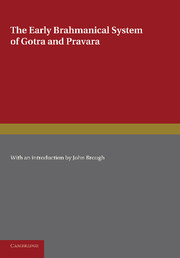 The Early Brahmanical System of Gotra and Pravara
The Early Brahmanical System of Gotra and Pravara from GOTRA-PRAVARA-MANJARī OF PURUŞOTTAMA-PAŅḌITA
Published online by Cambridge University Press: 05 June 2016
Baudhdyana says:
He who goes to a woman of his own gotra should perform the Cdndrdyana; and when he has fulfilled the vow, he should not forsake (her if she is) a Brahman woman (but should live with her), as if she were a mother or a sister; the offspring is not defiled, and is a Kasyapa—thus is it known. Now, in the case of coincidence (of a pravara-ra), a man should avoid marriage with those (families) mentioned in the same section (of the pravara-list as his own).1 The authority of Baudhayana is to be followed: for the people are human—thus is it known. Of the gotras, there are thousands, millions, and tens of millions; but their pravaras are forty-nine, as the ra-names in them show. Visvamitra, Jamadagni, Bharadvaja and Gautama, Atri, Vasistha, Kasyapa—these are the Seven Rsis; A gotra is made up of the descendants of the Seven Rsis, with Agastya as the eighth. He who knows his own pravara and those of others does not lose the right to perform sacrifices. The Veda is the Mantras and the Brahmanas, it is said. Therefore3 the twice-born should make a great effort to know the pravaras. Funeral rites, marriage, priests, hymns of praise, and the origin of gotras all stand firmly grounded in the ‘Great-Pravara (-chapter)’. He who constantly repeats the pravara-chapter every fortnight is magnified in the world of Brahma.
Purusottama comments :
A woman of his own gotra. One of his own pravara also is to be understood, since both are equally prohibited. The Cdndrdyana-penance is meant, because of its virtue as a means of purification. He should not forsake a Brahman woman. This prohibits the desertion which would (otherwise) be fitting as the result of being defiled by such a sin. ‘Like a mother or a sister’—this is meant to show that the sin of sleeping together and of intercourse, and the consequent penances, are the same as in the case of approaching sexually a mother or a sister. ‘The offspring is not defiled</>i’. I.e. in the case where the child was conceived in ignorance (of the identity of gotra), since we have the smrti-rule which designates as a Candala a child born from such a union knowingly entered into: ‘The offspring of a celibate ascetic… etc., and the son of a sagotra-marriage are said to be Candalas.’ And is a Kasyapa—thus is it known.
To save this book to your Kindle, first ensure no-reply@cambridge.org is added to your Approved Personal Document E-mail List under your Personal Document Settings on the Manage Your Content and Devices page of your Amazon account. Then enter the ‘name’ part of your Kindle email address below. Find out more about saving to your Kindle.
Note you can select to save to either the @free.kindle.com or @kindle.com variations. ‘@free.kindle.com’ emails are free but can only be saved to your device when it is connected to wi-fi. ‘@kindle.com’ emails can be delivered even when you are not connected to wi-fi, but note that service fees apply.
Find out more about the Kindle Personal Document Service.
To save content items to your account, please confirm that you agree to abide by our usage policies. If this is the first time you use this feature, you will be asked to authorise Cambridge Core to connect with your account. Find out more about saving content to Dropbox.
To save content items to your account, please confirm that you agree to abide by our usage policies. If this is the first time you use this feature, you will be asked to authorise Cambridge Core to connect with your account. Find out more about saving content to Google Drive.